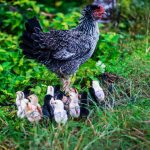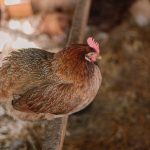The primary function of a rooster in a chicken flock is to serve as the leader and protector. Roosters are vigilant and protective, constantly monitoring for potential threats such as predators. They also maintain order within the flock by establishing a hierarchy, which reduces aggression and promotes harmony among the hens.
Roosters guide the flock to essential resources like food, water, and shelter. This leadership role is crucial for the flock’s well-being and survival. The presence of a rooster provides a sense of security for the hens, allowing them to thrive in their environment.
In addition to protection and leadership, roosters play a vital role in reproduction. They fertilize eggs, ensuring the continuation of the flock. Roosters also exhibit courtship behaviors and may defend their territory from other males.
Overall, the purpose of a rooster in a chicken flock is multifaceted, encompassing protection, leadership, guidance, and reproduction. These roles contribute significantly to the health, welfare, and sustainability of the flock.
Table of Contents
- 1 The Role of a Rooster in Reproduction
- 2 Behavior and Protection of the Flock
- 3 Noise and Disturbance Considerations
- 4 Managing a Rooster in an Urban Environment
- 5 Alternatives to Keeping a Rooster
- 6 Do You Really Need a Rooster?
- 7 FAQs
- 7.1 What is the purpose of a rooster in a chicken flock?
- 7.2 Do you need a rooster if you keep chickens for egg production?
- 7.3 Are there any benefits to keeping a rooster with a flock of hens?
- 7.4 Are there any drawbacks to keeping a rooster with a flock of hens?
- 7.5 Can hens lay eggs without a rooster present?
Key Takeaways
- A rooster’s purpose in a flock of chickens is to protect and lead the hens, as well as to fertilize their eggs.
- The role of a rooster in reproduction is to mate with the hens to fertilize their eggs, leading to the production of chicks.
- Roosters exhibit protective behavior towards the flock, alerting them to danger and defending them from predators.
- Considerations for noise and disturbance should be taken into account when keeping a rooster in an urban environment.
- Managing a rooster in an urban environment requires careful consideration of noise levels and local regulations.
- Alternatives to keeping a rooster include using artificial insemination or purchasing fertilized eggs.
- Before deciding to keep a rooster, consider the noise, space, and legal considerations to determine if it is necessary for your flock.
The Role of a Rooster in Reproduction
Fertilization Process
When a hen lays an egg, it is not yet fertilized, meaning it does not contain an embryo. However, when a rooster mates with a hen, he transfers sperm to fertilize the egg as it is being formed within the hen’s reproductive system. This fertilization process is crucial for the development of viable embryos and the subsequent hatching of chicks.
Courtship and Mating Behavior
In addition to fertilization, roosters also play a role in courtship and mating behavior within the flock. They engage in elaborate displays and vocalizations to attract the attention of the hens and establish mating opportunities. Roosters will often perform mating dances and vocalize loudly to signal their interest in mating with a particular hen. This behavior is essential for initiating the mating process and ensuring successful reproduction within the flock.
Importance of Roosters in Reproduction
Overall, the role of a rooster in reproduction is vital for the continuation of the flock and the production of new generations of chickens. Without roosters, the flock would not be able to reproduce, and the population would eventually decline. Therefore, roosters play a critical role in maintaining the health and sustainability of a chicken flock.
Behavior and Protection of the Flock

Roosters exhibit a range of behaviors that contribute to the overall well-being and protection of the flock. One of their most important behaviors is their constant vigilance and alertness to potential threats. Roosters are known for their keen sense of awareness and will often sound alarm calls to alert the hens to potential dangers.
They will also actively engage in defending the flock from predators, using their sharp spurs and aggressive behavior to ward off threats. In addition to protection, roosters also play a role in maintaining order and discipline within the flock. They establish a pecking order among the hens, ensuring that each bird knows its place within the hierarchy.
This helps to minimize aggression and maintain harmony within the flock. Roosters also engage in grooming behaviors, such as dust bathing and preening, which helps to keep the hens clean and free from parasites. Furthermore, roosters also exhibit nurturing behaviors towards the hens, such as providing food and calling them over to share resources.
They will often lead the flock to food sources and water, ensuring that the hens are well cared for and have access to essential resources. Overall, roosters play a crucial role in maintaining order, protection, and overall well-being within the flock.
Noise and Disturbance Considerations
One of the primary concerns associated with keeping a rooster in a residential or urban environment is the potential for noise and disturbance. Roosters are known for their loud crowing, which can be disruptive to neighbors and may violate noise ordinances in some areas. Their crowing can occur at any time of day but is most common in the early morning hours, which can be particularly bothersome for those living nearby.
In addition to crowing, roosters may also engage in other vocalizations, such as clucking and squawking, which can contribute to noise disturbances. These vocalizations are natural behaviors for roosters but can be perceived as disruptive in urban settings where noise levels are closely monitored. Furthermore, roosters may engage in aggressive behaviors towards humans or other animals, which can pose a safety concern in residential areas.
Their sharp spurs and aggressive nature can lead to potential conflicts and disturbances within the community. Overall, noise and disturbance considerations are important factors to take into account when considering whether to keep a rooster in an urban environment.
Managing a Rooster in an Urban Environment
Managing a rooster in an urban environment requires careful consideration and planning to minimize potential disturbances and ensure compliance with local regulations. One approach to managing a rooster in an urban setting is to provide appropriate housing and containment to minimize noise disturbances. This may involve constructing soundproof enclosures or coop designs that help muffle crowing and other vocalizations.
Another strategy for managing a rooster in an urban environment is to establish clear boundaries and guidelines for their care and behavior. This may include training and socializing the rooster to minimize aggressive behaviors towards humans or other animals. Additionally, providing enrichment activities and outlets for natural behaviors can help reduce stress and potential disturbances associated with keeping a rooster in an urban setting.
Furthermore, communication with neighbors is essential when keeping a rooster in an urban environment. Open dialogue and transparency about your intentions to keep a rooster can help foster understanding and cooperation within the community. Being responsive to concerns and addressing any issues that may arise can help maintain positive relationships with neighbors while keeping a rooster in an urban environment.
Alternatives to Keeping a Rooster

Fertilized Eggs
For those who are unable or unwilling to keep a rooster in their flock, purchasing fertilized eggs from a breeder or hatchery is a viable option. This approach allows hens to incubate and hatch chicks without the need for a resident rooster, enabling natural reproduction without the presence of a rooster within the flock.
Artificial Insemination
Another alternative is artificial insemination, which involves manually collecting and inseminating hens with sperm from a donor rooster. This method allows for controlled breeding without the need for keeping a resident rooster on-site.
Sexed Chicks
Some breeders offer sexed chicks, which are guaranteed to be female, eliminating the need for a rooster in the flock. This approach allows for egg production without the risk of fertilization or potential disturbances associated with keeping a rooster.
Conclusion
Overall, there are several alternatives available for those who prefer not to keep a rooster in their flock while still allowing for natural reproduction and egg production.
Do You Really Need a Rooster?
In conclusion, while roosters play important roles in providing protection, leadership, guidance, reproduction, and overall well-being within a flock of chickens, it is essential to carefully consider whether keeping a rooster is necessary or practical for your specific situation. The decision to keep a rooster should take into account factors such as noise and disturbance considerations, local regulations, housing and containment options, as well as alternatives to keeping a rooster. Ultimately, whether or not you need a rooster depends on your specific goals and preferences for your flock.
If natural reproduction is desired or if you value having a leader and protector for your hens, then keeping a rooster may be beneficial. However, if noise disturbances or safety concerns are significant factors, or if alternatives such as purchasing fertilized eggs or artificial insemination are viable options, then keeping a rooster may not be necessary. It is important to weigh the benefits and challenges associated with keeping a rooster and make an informed decision based on your individual circumstances.
By carefully considering all aspects of keeping a rooster in your flock, you can ensure that your chickens thrive while maintaining positive relationships within your community.
If you keep chickens, you may be wondering if you need a rooster to have a successful flock. According to a helpful article on Poultry Wizard, having a rooster is not necessary for hens to lay eggs. The article provides valuable information on the topic, including the benefits and drawbacks of keeping a rooster in your flock. It’s definitely worth checking out if you’re considering adding a rooster to your chicken coop. (source)
FAQs
What is the purpose of a rooster in a chicken flock?
A rooster’s primary role is to fertilize eggs, which allows for the hatching of chicks. Roosters also serve as protectors of the flock, alerting hens to potential danger and keeping order within the group.
Do you need a rooster if you keep chickens for egg production?
No, you do not need a rooster for egg production. Hens will lay eggs regardless of whether there is a rooster present. However, without a rooster, the eggs will not be fertilized and therefore will not hatch into chicks.
Are there any benefits to keeping a rooster with a flock of hens?
Yes, there are several benefits to keeping a rooster with a flock of hens. Roosters can help protect the flock from predators, provide fertilization for hatching chicks, and establish a social order within the flock.
Are there any drawbacks to keeping a rooster with a flock of hens?
Some potential drawbacks of keeping a rooster with a flock of hens include the potential for aggression towards humans or other chickens, noise from crowing, and the possibility of over-breeding or stress on the hens.
Can hens lay eggs without a rooster present?
Yes, hens can lay eggs without a rooster present. The eggs laid by hens without a rooster will be unfertilized and therefore will not develop into chicks.
Meet Walter, the feathered-friend fanatic of Florida! Nestled in the sunshine state, Walter struts through life with his feathered companions, clucking his way to happiness. With a coop that’s fancier than a five-star hotel, he’s the Don Juan of the chicken world. When he’s not teaching his hens to do the cha-cha, you’ll find him in a heated debate with his prized rooster, Sir Clucks-a-Lot. Walter’s poultry passion is no yolk; he’s the sunny-side-up guy you never knew you needed in your flock of friends!







